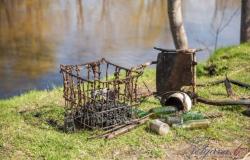Also, put in the bag food with a long shelf life and high calorie content that can be used without heat treatment, a multi-purpose folding knife and other things needed in emergency situations, such as some medicines and disinfectants.
Residents are advised to keep information about their blood type, allergies, chronic illnesses and the phone numbers of loved ones in the front pockets of their clothing.
It is recommended to identify shelters or shelters near residences and daily routes to minimize the effects of the blast shock wave, shrapnel, thermal radiation or radioactive contamination.
Shelters can be created and installed in the basements of various buildings.
The plan states that for a temporary shelter that can protect against bullets, ammunition fragments, debris of surrounding structures that may occur due to the use of various weapons, a ditch, construction pit, entrance to basements located outside the building, a pedestrian tunnel or any nearby reinforced concrete or brick structure can be used. behind which it is possible to take shelter, as well as places in rooms where there are at least two walls between a person and the outside of the building.
Residents are advised to consider the possibility of creating a shelter or shelter in the basement or underground floor of the building.
Content continues after commercial
Advertising
In the event of a military threat, the place of residence must maintain and periodically renew reserves of food, water and basic necessities that would allow for at least three to seven days of survival.
Residents are advised to discuss and agree with their relatives on an action plan in the event of a military invasion.
You should also find out the alternative travel routes that could be used to get to your most frequently visited destinations if the roads you use every day will not be usable.
It is also recommended to find out whether there are people living in the neighborhood with medical education, military experience and rescue work experience who, if necessary, could support the other residents of the neighborhood with expertise in the relevant fields in situations when the state or local government services will not be able to operate in a daily mode.
It is also said that it is desirable to find out whether there are springs and wells available in the vicinity, whose water quality meets the requirements to be used as drinking water.
Upon receiving information about a possible military invasion in the near future, residents should use adhesive tape to make X-type stickers on the window panes in several places to reduce the occurrence of glass shards in case of window deformation, and also move all objects near the windows that can cause shards to another place.
In the Civil Defense Plan adopted by the council today, algorithms have been developed on how to act for citizens in various crisis situations. Riga is the first public sector institution that has included practical information for citizens on how to prepare and act in the event of a military threat in its civil defense plan.
The civil defense plan was developed by the Civil Defense and Operational Information Department of the Riga municipality established last year in cooperation with a wide range of experts from the Ministry of Defense, the Ministry of the Interior, the National Armed Forces and the State Fire and Rescue Service (VUGD).
The plan also collects information and advice from the state defense authorities, it is supplemented with visual materials that make it easy to perceive and understand for every resident. The plan also includes information on gathering places in case of danger, evacuation points, food distribution points. Recommendations are also provided on how to communicate with other people, how to behave during the evacuation process, how to improve the place of refuge and other important information.
At the same time, the municipality is developing an information plan for residents to educate them on how to act in crisis situations. This year, various educational activities and seminars will take place, and based on the new civil defense plan, a visible booklet will be prepared for citizens, which will be available both digitally and in paper format.
On April 10, the seminar “General recommendations for residents at X hour” will be held, where residents will be informed about civil protection. In the seminars, residents will be informed about evacuation, safe places of refuge, involvement in national defense and other important issues of personal protection, says Ozola.
Tags: hour residents Riga advised maintain reserves drinking water food
-





